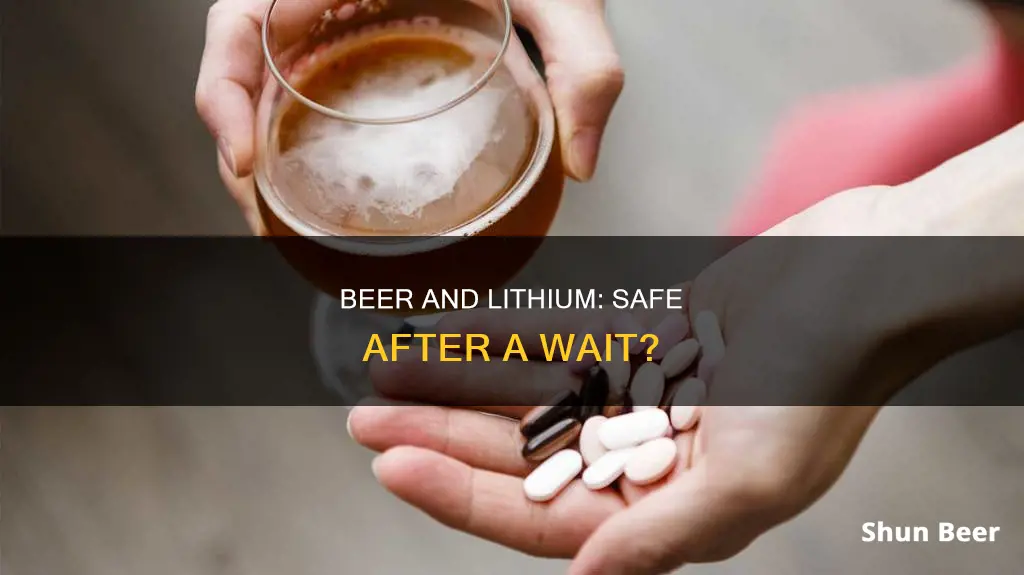
Drinking alcohol after taking lithium is not recommended by doctors. Lithium is a medication used to treat bipolar disorder, and it can have many side effects, including drowsiness, dizziness, and impaired thinking and judgment. Alcohol can worsen these side effects and also reduce the benefits of the medication. In severe cases, combining lithium and alcohol can lead to dehydration and lithium toxicity, which can be life-threatening. It is important to discuss the use of alcohol with your healthcare provider before consuming any alcohol while taking lithium.
| Characteristics | Values |
|---|---|
| Can I drink beer after a few hours of taking lithium? | Doctors advise against consuming alcohol while taking lithium. |
| How does alcohol affect people with bipolar disorder? | Drinking alcohol can worsen bipolar disorder symptoms, making the condition harder to treat. Alcohol can change a person's mood, leading to more mood swings. |
| How does alcohol interact with lithium? | Alcohol can decrease the benefits of lithium and increase its adverse effects. Alcohol and lithium have opposing effects on behavioural circadian rhythms, which can adversely affect sleep. |
| What are the side effects of combining alcohol and lithium? | Combining alcohol and lithium may cause dehydration and lithium toxicity, a potentially life-threatening complication. It can also increase the likelihood of side effects such as drowsiness, dizziness, and impaired thinking and judgment. |
| Are there any factors that increase the risk of combining alcohol and lithium? | People with AUD, liver problems, older adults (over 65 years), and those assigned female at birth are at higher risk when combining alcohol and lithium. |
What You'll Learn
- Doctors advise against drinking alcohol while taking lithium
- Combining alcohol and lithium may adversely affect sleep and circadian rhythms
- Alcohol may increase the side effects of lithium, such as sedation
- Drinking alcohol while taking lithium may make the medication less effective
- Alcohol can cause dehydration, which can lead to lithium toxicity

Doctors advise against drinking alcohol while taking lithium
Lithium is a medication that treats bipolar disorder, a condition that involves episodes of depression, periods of mania, or both. Bipolar disorder is a mental health condition where people experience drastic mood swings that cycle between periods of low moods (depression) and episodes of high moods (mania). While the way this medication works is not fully understood, researchers believe lithium may boost levels of certain chemicals, such as serotonin, in the brain.
Drinking alcohol while taking lithium can cause serious side effects. Alcohol can worsen bipolar disorder symptoms and intensify the side effects of lithium, including dizziness and drowsiness. Additionally, alcohol may make lithium less effective, leading to more mood swings. There is no amount of alcohol that is completely safe to drink while taking lithium.
Combining lithium and alcohol can also lead to dehydration and lithium toxicity, a potentially life-threatening complication. Lithium toxicity occurs when there are dangerously high levels of lithium in the blood. This can be caused by dehydration, as the body tries to retain as much water as possible, causing the kidneys to hold on to lithium for longer than usual.
Furthermore, alcohol and lithium have opposing effects on behavioural circadian rhythms, which are body processes such as sleep that follow a 24-hour cycle in response to light and dark. Drinking alcohol while taking lithium can adversely affect sleep and circadian rhythms, which may worsen symptoms of bipolar disorder.
Therefore, it is important for individuals taking lithium to avoid consuming alcohol. They should discuss any questions or concerns about this interaction with their healthcare provider.
Beer Drinking: A Path to Alcoholism?
You may want to see also

Combining alcohol and lithium may adversely affect sleep and circadian rhythms
Lithium is a medication that treats bipolar disorder, a condition characterised by episodes of depression, periods of mania, or both. It is often the first-choice medication for bipolar disorder, helping to stabilise mood and control emotions. While the exact mechanism of action is unknown, lithium is believed to boost levels of certain chemicals in the brain, such as serotonin, and may also protect and promote the creation of neurons.
Alcohol, on the other hand, affects the brain's functioning and impacts mood, which can worsen bipolar disorder. It slows down brain signals within the central nervous system, impairing functions like speech and coordination. When combined with lithium, alcohol can intensify the medication's sedating side effects, such as drowsiness and dizziness, and may reduce its therapeutic benefits.
Additionally, drinking alcohol while taking lithium can lead to dehydration, as alcohol inhibits the body's ability to regulate water levels. This dehydration can further increase the levels of lithium in the blood, leading to a potentially life-threatening complication known as lithium toxicity. Therefore, it is generally advised to avoid consuming alcohol while taking lithium to minimise these risks.
Beer and Kidney Cancer: Is There a Link?
You may want to see also

Alcohol may increase the side effects of lithium, such as sedation
Drinking alcohol while taking lithium can have serious side effects. Doctors typically advise against consuming alcohol while taking lithium, a medication prescribed for bipolar disorder.
Lithium has a very narrow therapeutic index, meaning that a small dosage change can have significant effects. Consuming alcohol alongside lithium can worsen its potential side effects, such as sedation. It can also adversely affect sleep and circadian rhythms.
Alcohol and lithium have opposing effects on behavioural circadian rhythms, which are body processes such as sleep that follow a 24-hour cycle in response to light and dark. Drinking alcohol while taking lithium may negatively impact sleep and circadian rhythms, potentially worsening bipolar disorder symptoms.
Additionally, alcohol may increase the side effects of lithium. Both substances can cause sedation, so taking them together can lead to increased drowsiness, posing a risk when driving or operating machinery. Dehydration caused by alcohol consumption can also lead to lithium toxicity, a potentially life-threatening complication.
It is important to discuss the risks of combining alcohol and lithium with a healthcare professional. While there may be unique risks depending on age and medical history, most advice suggests avoiding alcohol consumption while taking lithium.
Trappist Monks and Beer: A Complex Relationship
You may want to see also

Drinking alcohol while taking lithium may make the medication less effective
Drinking alcohol while taking lithium is not recommended by doctors. Both substances affect the central nervous system and have opposing effects on behavioural circadian rhythms, which are body processes such as sleep that follow a 24-hour cycle in response to light and dark.
Alcohol can worsen the side effects of lithium, such as sedation, dizziness, and drowsiness. It can also negatively impact sleep and increase the likelihood of dehydration, which can lead to lithium toxicity—a potentially life-threatening complication. Additionally, alcohol may reduce the benefits of lithium medication, making it less effective in treating bipolar disorder.
The effects of combining alcohol and lithium can vary depending on age, medical history, and other medications being taken. However, certain groups of people may be at higher risk when drinking alcohol while taking lithium, including those with alcohol use disorder (AUD), liver problems, individuals over 65 years old, and people assigned female at birth.
It is important to discuss the use of alcohol with a healthcare provider before consuming any alcohol while taking lithium. The healthcare provider can explain the risks and provide guidance based on individual circumstances.
Beer Overload: Hyponatremia's Unlikely Trigger
You may want to see also

Alcohol can cause dehydration, which can lead to lithium toxicity
Alcohol is a diuretic, meaning it increases urination and causes dehydration. Dehydration affects the levels of lithium in the body, which can lead to lithium toxicity.
Lithium is a medication used to treat bipolar disorder and depression. It is a powerful mood-stabilizing medication with a narrow therapeutic index, meaning that even a small change in dosage can have significant effects. Doctors usually advise people taking lithium to avoid alcohol consumption.
When you drink alcohol, your body loses vital fluids and electrolytes. This is because alcohol is a diuretic, which means it increases the production of urine. As a result, you urinate more than the amount of liquid you consume when drinking alcohol. For example, if you drink 200 millilitres of beer, you will urinate about 320 millilitres of urine. This is because alcohol interferes with the mechanism that regulates water levels in the body.
Drinking alcohol can lead to dehydration, which can affect the levels of lithium in the body. Dehydration is a factor that can increase the concentration of lithium in the body and lead to lithium toxicity. Therefore, it is important to avoid alcohol consumption when taking lithium to prevent the risk of lithium toxicity.
In addition to the risk of dehydration, alcohol can also worsen the side effects of lithium. Both lithium and alcohol can cause sedation, so taking them together can increase drowsiness. This can pose a danger when performing activities that require alertness, such as driving or operating machinery.
Beer and Amlodipine: Is It Safe to Drink?
You may want to see also
Frequently asked questions
It is not advisable to drink alcohol while taking lithium. Combining alcohol with lithium can increase the medication's sedative side effects, such as drowsiness, dizziness, and impaired thinking and judgment. It may also reduce the benefits of the medication. In severe cases, it can lead to dehydration and lithium toxicity, which can be life-threatening.
Drinking alcohol while taking lithium can intensify the medication's sedative side effects, such as drowsiness, dizziness, and impaired thinking and judgment. It may also make the medication less effective.
Drinking alcohol while taking lithium can be dangerous as it can increase the risk of dehydration, which can lead to high levels of lithium in the blood, known as lithium toxicity. This is a potentially life-threatening complication.
It is recommended to avoid drinking alcohol during the first few days of taking lithium or if your dose has been increased. If you feel okay after this initial period, you may drink alcohol in moderation, but it is important to monitor your fluid intake to avoid dehydration.
The signs and symptoms of lithium toxicity include feeling very lightheaded or drowsy, extreme confusion or blackouts, increased urination of diluted urine, ringing in the ears (tinnitus), muscle weakness or twitches, and vomiting or diarrhea. If you experience any of these symptoms, seek immediate medical attention as lithium toxicity can be life-threatening.







